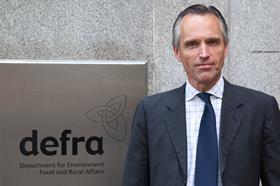
With a new secretary of state and a general election on the horizon, it is an interesting time in the Department for Environment, Food and Rural Affairs.
Lord de Mauley, also known as Rupert Ponsonby, seventh baron de Mauley, is the minister for the natural environment and science in the House of Lords, and in his own words “deals with matters like biodiversity, national parks, and the agri-tech strategy”.
Previously a minister for resources and waste management, as well as shadow minister for children, schools and families, and energy and climate change, Eton-educated de Mauley has been with Defra for around a year. One of his responsibilities has included heading up the initial stages of the National Pollinator Strategy (NPS), which launched in July 2013 as a “call to arms” to better monitor pollinator research, and examine the effectiveness of integrated pest management, among other issues.
Speaking in an exclusive interview with FPJ at this year’s National Fruit Show, de Mauley is courteous, well-spoken and much more comfortable discussing the benefits of linking technology with on-the-ground farming, than the new secretary of state’s plan for the department. For the most part popular with those I ask, if industry whispers are correct the one criticism seems to be that it’s been quite difficult to get the peer out on farm visits, although he assures me this is something he does, especially during the summer parliamentary recess.
So what does he think of the new face at Defra? “She [Liz Truss] is great. I am a personal friend of [previous Defra secretary of state] Owen Paterson – I liked and admired him, and I found him a very good secretary of state, but the great thing is we are going in the same direction. She’s perhaps brought a bit of youth and good looks to the job, but also brains,” he says.
De Mauley says Truss’s priorities for the department are more “nuanced” than the “more easily remembered” ones of her predecessor, Owen Paterson. So nuanced, in fact, that he is unable to list them, and has to resort to asking his PA while wryly commenting that he’s “glad the BBC didn’t ask that question”.
With the help of a follow-up email, Truss’s priorities are listed as: leading the world in food and farming; protecting the UK from floods and animal and plant diseases; improving the environment; championing the countryside and improving rural services.
Listening to politicians can often be a case of reading between the lines and interpreting what isn’t said, and consequently the fact that Truss has a business-orientated and ambitious top priority to lead the world in food production may be encouraging for the farming industry, while the less newsworthy “improving the environment” as point three might also suggest something about her future direction.
The focus on trade certainly seems to be a deep-running theme in a Conservative-led future for British agriculture, and I ask what de Mauley believes will be the party’s frontline policies for the agri-industries in the run-up to general elections next May.
“I think it will be to promote British products both domestically and internationally. [The government] has opened three new markets every week since 2010. So that’s strand one,” he says.
“I would say secondly, it’s about the use of technology and innovation, and spreading that around. We have brilliant universities and institutions, but it’s about getting those ideas out onto farms. And tackling pests, diseases and the effects of climate change would be my strand three.”
With UKIP’s ever-vocal call for a referendum to leave the European Union, how does de Mauley think the farming industry would remain competitive without EU subsidies? He skirts the question in order to emphasise the Tory preference to remain united: “What’s really important to us is to change the European model. We need to negotiate a better solution with Europe, and stay in, because I think that is very important.”
Last week retailers came under fire from the NFU for stocking imported apples at the peak of the English apple season, but de Mauley believes instead UK producers should be looking elsewhere for growth. “What is really good, in the face of quite difficult conditions for our producers, is that our retailers are continuing to respond to consumer demand for local produce, so actually they’re being pretty loyal.
“And the other track is that we should be expanding our exports, and that’s what we’ve been working on. And we need to spread our reach, rather than focusing on a limited number of markets.”
According to a Defra announcement at the Sial trade fair last week, the government has “smashed” targets to help over 2,500 firms export to food companies worldwide since launching the UK Food and Drink International Action Plan in October 2013 – raising £300 million for the UK economy. With calls to producers looking to export to come forward for marketing support from UKTI, and Truss’s ambitious focus on trade for the future, it’s clear this government’s export drive is far from over.



